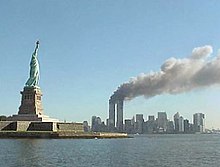"Why quit our own to stand upon foreign ground? Why...entangle our peace and prosperity in the toils of European ambition, rivalship, interest, humor or caprice? ... Taking care always to keep ourselves by suitable establishments on a respectable defensive posture, we may safely trust to temporary alliances for extraordinary emergencies."
-- George Washington, Washington's Farewell Address 1796
| President Truman, 1947 |
After the second World War, tensions between Communism and Democracy exploded into the Cold War as the world became divided between Western and Eastern spheres of influence. In 1947, President Truman gave a speech that would become known as the "Truman Doctrine". He committed America to preventing the spread of Communism throughout the free Western world, starting by providing aid to Turkey and Greece. In Stark contrast to Washington's outdated policy of isolationism, Truman stated "I believe that it must be the policy of the United States to support free peoples...The free peoples of the world look to us for support in maintaining their freedoms." Three years following the announcement of the Truman Doctrine, NSC-68 was written. NSC-68 further defined America's role of actively preventing the global spread of Communism. As a result of the policy of Containment and the Truman Doctrine, NATO (The North Atlantic Treaty Organization) was created to form a united front against the Soviet Union and the Communist ideals it attempted to expand.
 |
| Twin Towers on 9/11 |
Just half a century later, America would employ a similar strategy and rationale against a new enemy -- terrorism. While George W Bush was president, terrorists crashed commercial jets into the World Trade Center on 9/11. As a result, in 2001 President Bush approved Operation Enduring Freedom (OEF) to destroy Osama bin Laden and his followers hiding in Afghanistan. Just as under Truman, American troops were sent into a foreign country for the protection of American and democratic ideals. In 2002, a National Security Strategy was issued, reminisce of NSC-68. Like NSC-68, it outlined America's role in a changing and contentious world. However, unique to the 2002 document, America would now exercise the policy of preemptive war to prevent the spreading of terrorism and anti-American sentiment in the East. Following the end of OEF, Bush used the policy and waged war against Iraq in the Iraq War.
Similar to Truman, Bush was attempting to stop the spread of ideas and anti-Western sentiment -- in the 1950's the idea of Communism, and in the 2000's terrorism. Obviously, Communism and terrorism due to anti-Western sentiment are not the same (contrary to the belief during the Red Scare), but both ideologies were in opposition to the democracy America represented. In both time periods, presidents were fighting against the East. Ironically, both were trying to prevent anti-American sentiment but their use of force only increased tension (as seen through the backlash abroad of the Iraq War and following Truman's policy, the Vietnam War in the Cold War Era). While these two periods are similar, we also see the increase in American action in foreign countries. All the way at the founding of America, George Washington preached isolationism. At the end of World War I, the US arguably entered its first European conflict. By World War II, America was fully committed into foreign affairs and establishing a new world order. Throughout the 20th century and entering the 21st, the trend continued as the US increased its interaction and interference with other countries by way of the Truman Doctrine and the goals of stopping anti-American and anti-Western sentiment abroad.
Sites:
http://avalon.law.yale.edu/18th_century/washing.asp
http://avalon.law.yale.edu/20th_century/trudoc.asp
https://www.history.com/speeches/the-truman-doctrine
Class notes
Great post Karenna! I think it's really interesting that we can see the continuation of containment throughout American history. American leaders have always been determined to stop the spread of ideas that oppose American ideals. On the other hand, America is also known for promoting the spread of ideas in support of patriotism and democracy. This goes way back to the very beginning of colonization in the Americas, when European settlers tried to spread their religion to the Native people. As another example, Woodrow Wilson wanted to "make the world safe for democracy" and spread American ideas to other countries. There has been a lot of containment of ideas, but there is also some spreading of ideas to promote American values.
ReplyDelete